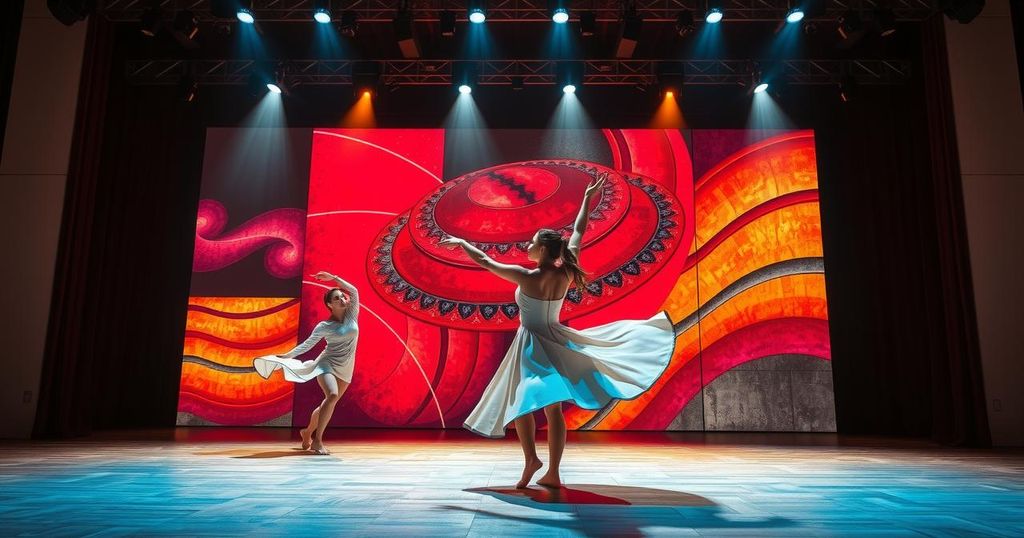Lebanon’s Theatre Scene Resurfaces Amid Echoes of War

Lebanon’s theatre scene is reviving despite the challenges of post-war conditions and ongoing economic crisis. Playwrights like Ali Chahrour and Fatima Bazzi are addressing the struggles of migrant workers and personal trauma through their art, while reflective works such as Bazzi’s “Suffocated” showcase the resilience of artists in conveying narratives influenced by conflict. The local theatre is slowly regaining momentum, aiming to offer hope and healing.
In a powerful revival of Lebanon’s cultural scene, theatres are emerging from the shadows of last year’s war, where art continues to resonate in the face of adversity. Ali Chahrour, a notable playwright and choreographer, is at the forefront, having created a moving performance titled “When I Saw the Sea.” This piece reflects on the stories of migrant workers affected by the conflict, and debuted in Beirut in early May, with future plans for European stages, including the prestigious Avignon Festival.
Chahrour’s commitment to the performing arts remains unwavering, stating, “This project was born during the war. I did not want to stop making theatre, because I don’t know how to fight or carry weapons, I only know how to dance.” The production features three women: two Ethiopian domestic workers and a Lebanese Ethiopian, who collectively narrate tales of exile and hardship, paying homage to the lives lost during the violent two-month war between Hezbollah and Israel.
Many migrant workers in Lebanon faced horrific circumstances during the conflict, with countless individuals fleeing to NGO shelters after employers abandoned them amidst the chaos. The play sheds light on these issues, emphasizing the often-neglected struggles of migrant women in a country criticized for its mistreatment of foreign labor.
Fatima Bazzi, another influential voice in the Lebanese theatre community, found her artistic direction altered by personal experience in her latest play, “Suffocated.” Displaced from her home in the southern suburbs of Beirut—an area targeted during the conflict—Bazzi’s work evolved as she sought to mirror her own escape, which took her as far as Iraq before returning to Lebanon.
“We took advantage of this in the performance, the idea of separation and distance from each other, how we worked to continue the play,” Bazzi explained, reminiscing during a rehearsal. Moments in her work poignantly reflect the trauma of lived experiences; characters react to bomb sounds onstage, echoing their real-world anxieties and fears.
Despite the reopening of theatres, the local arts scene faces ongoing challenges due to the severe economic crisis that has plagued Lebanon since 2019. Omar Abi Azar, founder of the Zoukak collective, revealed that a planned festival was postponed because of the war. Yet he remains hopeful, saying, “Now we have started to pick up the pace again.”
His own work, “Stop Calling Beirut,” intertwines personal loss with recollections of childhood during the civil war, highlighting the profound impact conflict has had on his artistic voice. Abi Azar lamented, “We are children of war. We were born, raised, and grew up in the heart of these crises. This is not a challenge, but rather our reality.”
Ultimately, arts in Lebanon endure as a beacon of hope amid the tumult, with creatives like Chahrour, Bazzi, and Abi Azar standing resilient in the face of adversity. Through their stories, they are not merely reflecting the struggles of their time but are also carving pathways toward recovery and healing through art.
The resurgence of Lebanon’s theatre scene illustrates the resilience of artists who, despite the lingering effects of war and economic strain, continue to create compelling narratives that highlight social issues and personal hardship. Ali Chahrour and Fatima Bazzi have exemplified how art can serve as both a response to conflict and a means of catharsis. Their works illuminate the experiences of marginalized communities, while theatre, as expressed by Omar Abi Azar, remains a lifeline amid crisis, signifying hope in Lebanon’s complex reality.
Original Source: www.france24.com







